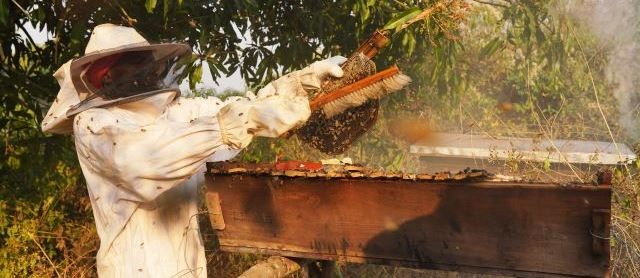“My father used to harvest wild honey from anthills and trees; he was an expert in traditional beehives and as young as 15, I had already acquired these vital traditional skills. We learned to work the hard way without protective gear and using fire that killed the bees in order to harvest this honey”.
Andrea Roto is a beekeeper and member of the Mborisa beekeeping group in Yambio County, Western Equatoria State. At an early age, Andrea learned traditional beekeeping practices that have been used in South Sudan for centuries. As Andrea states above, these techniques use fire that reduces the honey quality and kills the bees, sometimes destroying entire colonies. In addition to this, many traditional hives endanger tree species used for construction.
Nevertheless, the year-round demand for honey in South Sudan goes far beyond current production capabilities. Honey is used as a nutrient-rich sweetener in food and beverages throughout the country, and medicinally as it has been proven to possess antifungal, detoxifying, and antiseptic capabilities. In addition to this, beekeeping can increase agricultural yields by 20 percent through pollination.
In 2018, the Sustainable Agriculture for Economic Resiliency (SAFER) project, funded by the United States Agency for International Development (USAID) and implemented by the Food and Agriculture Organization of the United Nations (FAO), began to support new and existing beekeeping groups in Western Equatoria. The beekeepers in Mborisa are one of the 27 beekeeping groups in three counties, Yambio, Nzara and Tambura that have received assistance from FAO through the provision of modern beekeeping equipment and training on improved, sustainable bee production practices including making improved beehives from locally available material.
“I can now make modern beehives from material that is locally available and I have been able to increase the number of my beehives from 25 to 80,”says Andrea.
With the modernization of practices, the groups have been able to increase their production in both quantity and quality. Starting in January 2020, local producers such as Mborisa and other local beekeeping groups supported by the SAFER project have been linked to private companies, greatly expanding their market. As of March 2020, the five local groups have been able to harvest 39 beehives and sell over 778 kg of honey, earning them over 324 200 South Sudanese Pounds (about 2,489 USD).
As Andrea says, “Once you go into honey production, you never quit!”




